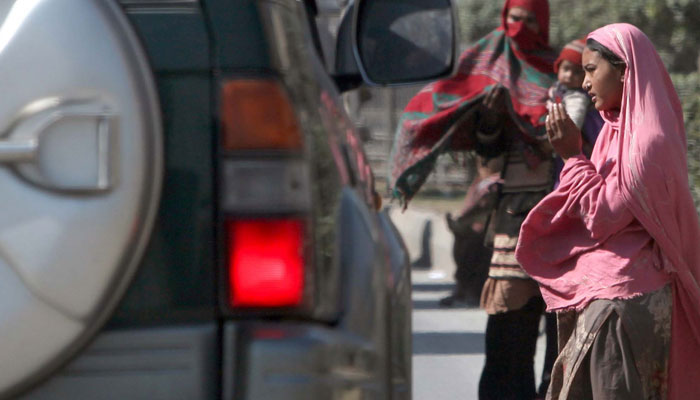Begging in question
International dimension of this crisis demands more nuanced understanding
News that over 5,000 Pakistanis have been deported from Saudi Arabia for begging since January this year – and nearly 370 from several other countries – has sparked outrage but really ought to be followed by reflection. The numbers, shared by the interior minister in the National Assembly, paint a troubling picture: Pakistanis, often in desperate situations, finding themselves on foreign soil with no means of survival but to beg. But while the headlines may induce national shame, they must also prompt a more meaningful interrogation of how and why we have reached this point. It is easy to dismiss this issue as a ‘professional beggars’ case, tarnishing the country’s image abroad. Indeed, Pakistan has long struggled with organised begging rings, where entire families are coerced into earning daily quotas for exploitative contractors. But the international dimension of this crisis demands a more nuanced understanding.
Human traffickers and shady agents prey on the desperation of people from economically marginalised backgrounds. They lure them to other countries with promises of jobs or better futures. By the time these individuals arrive, their meagre savings are gone, the promised work is nowhere in sight, and they are left stranded, often criminalised for resorting to survival mechanisms like begging. In such cases, the lines between victim and offender blur, and it becomes incumbent upon the state to act firmly as well as with compassion. The government has taken some steps to prevent the outflow of such individuals, including improving immigration checks and placing nearly 4,000 people on the Exit Control List. While this may appear to be a proactive approach, it is largely reactive, merely treating the symptoms rather than addressing the disease. Restrictive immigration controls may block some from boarding flights, but they do not eliminate the conditions that push them toward desperate choices.
A more effective strategy must include dismantling trafficking networks, cracking down on travel agents and contractors who send people abroad under false pretences, and ensuring that vulnerable individuals are not unjustly penalised. Those knowingly exploiting others for financial gain must be held accountable through strong legal and punitive mechanisms. Support systems for Pakistanis abroad must also be significantly improved. In many cases, deportations occur due to minor infractions or unexpected expenses like fines – costs that could have been handled if embassies were more responsive and equipped with help desks offering timely legal guidance. Awareness campaigns and embassy outreach programmes must become central to our foreign policy priorities. The real root though is the economic hopelessness at home. People are trying to leave not for luxury, but for survival. The only long-term solution is giving people tools to sustain themselves legally and respectfully abroad. The idea should not be to stop people from leaving the country but to ensure they leave with dignity, purpose, and preparation. The deportation of thousands of beggars may be embarrassing, but it is also an indictment of a broken system – one that fails its most vulnerable. Shame alone will not solve this crisis.
-
 Caleb McLaughlin Shares His Resume For This Major Role
Caleb McLaughlin Shares His Resume For This Major Role -
 King Charles Carries With ‘dignity’ As Andrew Lets Down
King Charles Carries With ‘dignity’ As Andrew Lets Down -
 Brooklyn Beckham Covers Up More Tattoos Linked To His Family Amid Rift
Brooklyn Beckham Covers Up More Tattoos Linked To His Family Amid Rift -
 Shamed Andrew Agreed To ‘go Quietly’ If King Protects Daughters
Shamed Andrew Agreed To ‘go Quietly’ If King Protects Daughters -
 Candace Cameron Bure Says She’s Supporting Lori Loughlin After Separation From Mossimo Giannulli
Candace Cameron Bure Says She’s Supporting Lori Loughlin After Separation From Mossimo Giannulli -
 Princess Beatrice, Eugenie Are ‘not Innocent’ In Epstein Drama
Princess Beatrice, Eugenie Are ‘not Innocent’ In Epstein Drama -
 Reese Witherspoon Goes 'boss' Mode On 'Legally Blonde' Prequel
Reese Witherspoon Goes 'boss' Mode On 'Legally Blonde' Prequel -
 Chris Hemsworth And Elsa Pataky Open Up About Raising Their Three Children In Australia
Chris Hemsworth And Elsa Pataky Open Up About Raising Their Three Children In Australia -
 Record Set Straight On King Charles’ Reason For Financially Supporting Andrew And Not Harry
Record Set Straight On King Charles’ Reason For Financially Supporting Andrew And Not Harry -
 Michael Douglas Breaks Silence On Jack Nicholson's Constant Teasing
Michael Douglas Breaks Silence On Jack Nicholson's Constant Teasing -
 How Prince Edward Was ‘bullied’ By Brother Andrew Mountbatten Windsor
How Prince Edward Was ‘bullied’ By Brother Andrew Mountbatten Windsor -
 'Kryptonite' Singer Brad Arnold Loses Battle With Cancer
'Kryptonite' Singer Brad Arnold Loses Battle With Cancer -
 Gabourey Sidibe Gets Candid About Balancing Motherhood And Career
Gabourey Sidibe Gets Candid About Balancing Motherhood And Career -
 Katherine Schwarzenegger Shares Sweet Detail From Early Romance Days With Chris Pratt
Katherine Schwarzenegger Shares Sweet Detail From Early Romance Days With Chris Pratt -
 Jennifer Hudson Gets Candid About Kelly Clarkson Calling It Day From Her Show
Jennifer Hudson Gets Candid About Kelly Clarkson Calling It Day From Her Show -
 Princess Diana, Sarah Ferguson Intense Rivalry Laid Bare
Princess Diana, Sarah Ferguson Intense Rivalry Laid Bare




